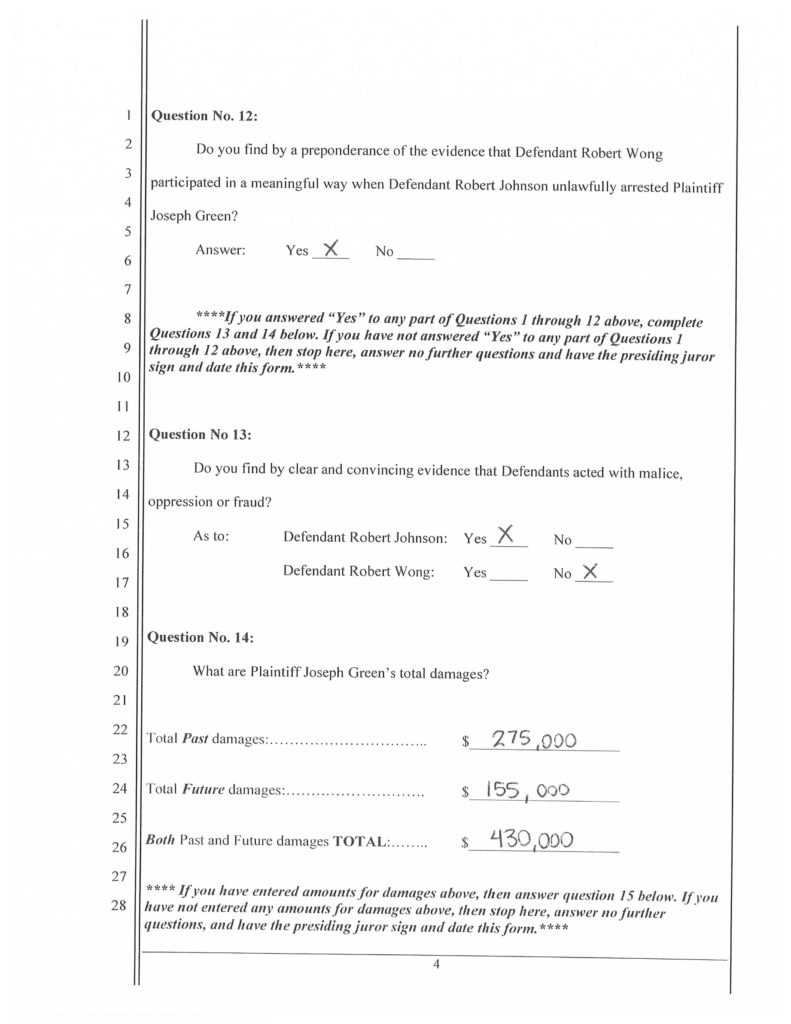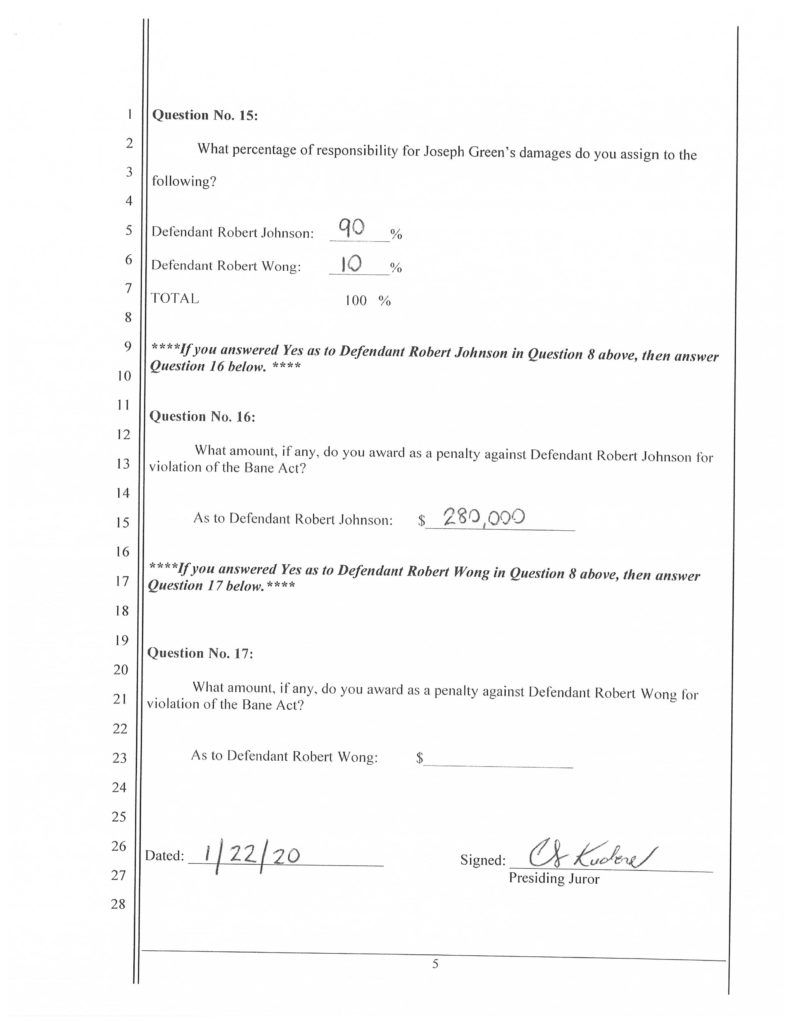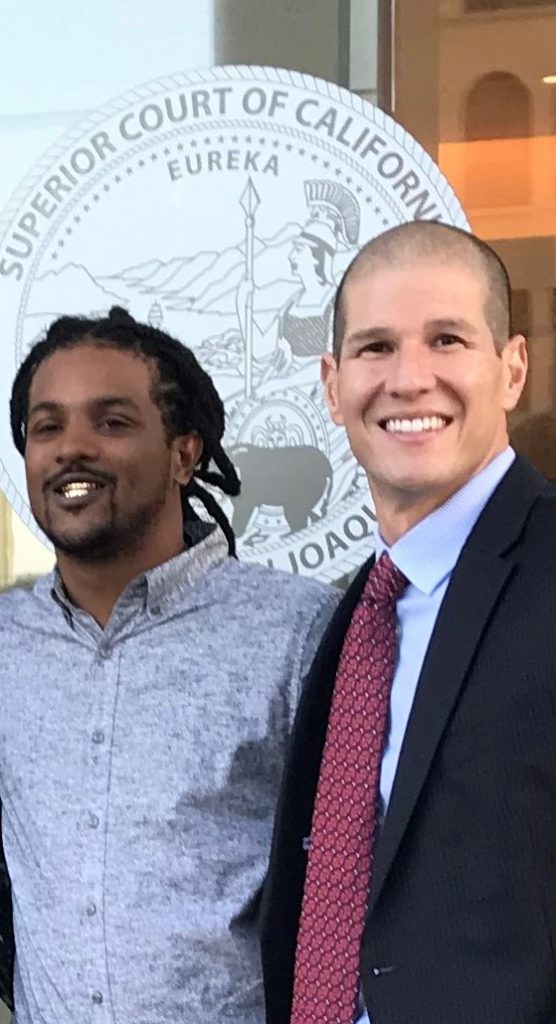Civil Rights Attorneys from Piccuta Law Group Obtain $710,000 Jury Verdict in High-Profile Police Excessive Force Case
Not less than two weeks ago, on January 22, 2020, civil rights attorneys from Piccuta Law Group won a civil rights police excessive force case. The case was against police officers from the City of Stockton, the City of Stockton Police Department and the City of Stockton itself. The case was tried to a jury and a jury verdict was rendered in favor of the firm’s client in the amount of $710,000.
The Details Regarding the Civil Rights Case for Police Excessive Force
To learn more about the details of the case, read last month’s blog post. To summarize, the case involved the firm’s client, who was a 16-year-old African American teenager at the time. The teenager went to a convenience store in Stockton with his mother and five-year-old sister to buy gas. The teenager then went inside the convenience store to buy candy for his younger sister. He tried to pay with a torn dollar bill and the convenience store clerk refused it.
The teenager and the clerk started arguing over accepting the dollar bill. A plain-clothes police detective from the City of Stockton, named Robert Johnson, was on duty and in line behind him. Officer Johnson did not have his badge visible and told the teenager to “get the f**k out the store” or something similar. Not knowing it was a police officer, the teenager told Johnson to mind his own business. Johnson replied that he was a police officer and the teenager said “I don’t see a badge on you and I’m not doing anything wrong” or something similar.
The teenager then turned to leave the store with his dollar bill. Once he exited, Johnson grabbed him from behind, pulled him back in the store and took him to the ground. Once on the ground, Johnson pinned him with his knee and punched him in the face 2-3 times. Officer Johnson’s partner came over to assist and stood on the teenager’s legs. After the teenager was handcuffed, with his hands behind his back, Johnson took the back of his head and smashed his face into the floor. The teenager had his two top front teeth knocked out and his bottom lip split.
Video surveillance captured the incident. The video surveillance was the key evidence at trial. Below is a portion of the video surveillance with captions explaining the same. The below video was prepared and posted to YouTube by San Francisco media outlet KQED.
The officers did not call for an ambulance to treat the client at the scene. They also did not take him straight to the hospital. Instead, they took him to the station where they photographed his injuries and cited him for trespassing and resisting arrest. However, while they were still at the store, Johnson staged evidence. Specifically, Johnson took some hand-held shopping baskets out of a rack and placed them at an angle in the middle of the aisle.
Johnson would then report that they were struggling, accidentally fell over the baskets, and that the fall caused the teenager to land face first and lose his teeth. Johnson would not report that he smashed the teenager’s face into the floor while he was handcuffed. His partner also failed to report any of the strikes that Johnson used. His partner failed to report the face slam as well. His partner also never stopped Johnson when he was attacking the client.
The teenager later received mental health counseling for depression and post-traumatic stress disorder. He would report having a recurring nightmare of the police officer chasing him that caused him to wet his bed repeatedly. He claimed that the loss of his teeth caused him to be embarrassed, less social and led to severe depression.
Civil Rights Attorneys from Piccuta Law Group Stepped Up to Try the Case
The case was originally handled by a different attorney. However, that attorney did little to work up the case properly. That attorney failed to do the necessary investigation or press the other side for important documents. Essentially, that attorney did not bring the fight to the other side. He just went through the motions and prepared the case to be settled instead of to be won by a jury trial.
The worst thing a client can have is an attorney who is scared of trial and unwilling to put in the work to obtain the best result.
The client attended a mediation with his former attorney. A mediation is basically a meeting with the other side where a mediator acts as a middle man and tries to get both sides to reach an agreement. At the mediation, the client was offered approximately $37,000 to settle his case. When the client refused, his former attorney grew angry and told him he would not try the case. The previous attorney told the client he would have to find a new attorney. According to the client, the attorney was so upset that he stopped speaking to the client and just stared out the window for the rest of the mediation. Shortly after, the client found Piccuta Law Group and hired its civil rights attorneys and trial lawyers to handle the case.
The Piccuta Law Group took over the case and started working it aggressively. Charles Tony Piccuta served as lead trial counsel. The case was prepared for trial and the necessary sworn statements and documents were obtained. The week prior to trial, the defense attorneys for the other side, presented Piccuta and his client with an offer of $100,000 to settle the case. Piccuta told them to add a zero and that he would see them the first day of trial to select a jury.
Our firm is not made up of paper-pushers with law degrees who simply look to settle cases with insurance companies and take a cut.
Piccuta is no trial coward and regularly tries high-stakes cases. The worst thing a client can have is an attorney who is scared of trial and unwilling to put in the work to obtain the best result. The Piccuta Law Group has real trial lawyers who prepare every case for trial. Our firm is not made up of paper-pushers with law degrees who simply look to settle cases with insurance companies and take a cut. We look to win our cases, in front of a jury when necessary, and maximize the compensation for our clients.
The Jury Awarded $710,000 and There Will Be No Appeals of the Result
After a two-and-a-half-week jury trial, the jury took less than a day to reach its decision. It ruled in favor of the firm’s client on each and every claim against Officer Johnson. This included state law claims for: assault, battery by a police officer, intentional infliction of emotional distress and violations of California’s Bane Act. It also ruled in favor of the client and against Johnson on every federal claim. This included claims for: free speech retaliation in violation of the First Amendment, arrest without probable cause (unlawful arrest) in violation of the Fourth Amendment, excessive force in violation of the Fourth Amendment and failure to provide needed medical care for someone in custody in violation of the Fourth Amendment.
The jury also found that Johnson’s partner, Officer Robert Wong, failed to intervene and stop Johnson when he used excessive force on the firm’s client. The jury awarded the client $275,000 in past pain and suffering, $155,000 in future pain and suffering and $280,000 as a statutory penalty for the violation of the Bane Act. The total amount awarded was $710,000. Of this amount, the jury apportioned 90% of it to Johnson and 10% of it to his partner and the City.
-

Pg. 4 of the actual verdict entered in the case. -

Pg. 5 of the actual verdict entered in the case.
However, the jury also found, by clear and convincing evidence, that Johnson acted with malice, oppression or fraud. This gave the client and Piccuta the ability to pursue punitive damages in a second phase of the trial. Punitive damages are also known as punishment damages. They may be pursued when there is a finding of “malice, fraud or oppression,” as was the case here. The purpose of punitive damages is to punish a bad actor for his or her conduct and to deter and discourage similar conduct by the bad actor or others in the future.
The purpose of punitive damages is to punish a bad actor for his or her conduct and to deter and discourage similar conduct by the bad actor or others in the future.
The three primary factors considered in awarding punitive damages and the amount are:
- How reprehensible or despicable was the conduct of the bad actor?
- Is the relationship between the amount of the punitive damages and the client’s harm reasonable?
- The ability to pay and overall financial status of the bad actor.
In determining how reprehensible of despicable the conduct of the bad actor is, a jury is allowed to consider:
- If the wrongful conduct caused physical harm
- If the bad actor disregarded another’s health or safety
- If the person injured was especially vulnerable
- If the bad actor’s conduct involved a pattern or practice
- If the bad actor acted with trickery or deceit
After the jury gave its verdict, Officer Johnson was forced to turn over his financial records. This included bank account statements, retirement account holdings, property title information, vehicle title information, weekly paycheck amounts, among other things. After evaluating the financial condition of Johnson, Piccuta and the client agreed to not pursue the punitive damages phase in exchange for: payment of the full $710,000 within sixty days; a waiver of any challenges to the verdict; a waiver of all appeal rights; and a waiver of any application of the City of Stockton’s previous bankruptcy.
The City of Stockton declared bankruptcy after the incident, and a question existed as to whether or not the bankruptcy would apply to the verdict. If the bankruptcy did apply, the amount awarded could have been reduced to pennies on the dollar. The client’s claim was presented in the bankruptcy. However, a final decision was never made as to what effect the bankruptcy had on the claim.
In addition, the parties further stipulated that Piccuta could still request his attorney fees from the court, submit a request for costs and seek an additional $25,000 statutory penalty as arguably allowed under the Bane Act. The attorney fees that Piccuta will ask the Court to award will be in excess of $500,000. The costs sought to be recovered will be in excess of $25,000.
This agreement was reached in court before the jury was released. As such, the client will receive his share of every penny of the amount awarded by the jury. The amount will not be reduced and will be paid quickly. The client will not be forced to wait several years for appeals and challenges of the verdict. He will have the benefit of the result immediately.
The Jury Verdict Delivered Justice and Brought the Client Closure
The amazing verdict will bring the client closure. The incident originally occurred in 2011 and the client waited over eight years to have his day in court and tell his story. He was sixteen when the event happened and 25 years old at the time of trial. The main reason the case took so long to get to trial is because it was stopped for several years when the City of Stockton was in Bankruptcy.
-

Client pictured around time when incident happened. -

Client pictured around time of trial.
After the client testified in Court, he told Piccuta that he felt like a million bricks had been lifted off his shoulders. During trial, the client told Piccuta “that not all super-heroes wear capes.” At the conclusion of the trial, the client thanked Piccuta for taking the case to trial. The client then told Piccuta that Johnson would have gotten away with this if it wasn’t for Piccuta stepping up and stepping in.
During trial, the client told Piccuta that not all super-heroes wear capes.
Trial was long and hard for Piccuta. He was away from his family and four-year-old son for nearly three weeks. He was sick during the first week and a half of trial. Throughout the trial, he got little rest and routinely worked until midnight and woke up at 5:00 AM to handle the barrage of items the defense team threw at him. The two officer defendants were represented by different law firms. Those law firms had multiple attorneys and paralegals working on the case and the resources and deep pockets of the City backing them.
-

Piccuta with the client after receiving the verdict.
The client himself made a huge sacrifice in taking his case to trial. He was unable to work for three weeks and lost a significant amount of pay. He also had to open up his personal life and tell the jury each and every intimate detail regarding his depression and mental health conditions following the incident. He also had to be brave enough to trust the process and give up a guaranteed $100,000 previously offered as settlement. The client had to trust in Piccuta and put his fate in the hands of twelve strangers who would be asked to deliver justice.
The twelve jurors in this case did exactly that. They rendered a verdict that spoke loud and clear. Each and every juror stayed, after they were excused by the Court, to talk to the client and Piccuta. The client shook each and every one of their hands and thanked them for what they did. The jurors did not speak to Johnson. Johnson simply stared out the window of the 10th Floor of the City of Stockton Courthouse looking down at the City that he once policed. Johnson was exposed for the liar, criminal and coward that he truly is.
The verdict does more than bring justice to the client. It brings justice and safety to the community at large. The majority of police officers strive to do a good job and uphold the duties of the badge, but there are bad apples that ruin the bunch. These individuals leave a black mark on the policing profession. They abuse their power and believe they are above the law.
However, they are not above the law when they are inside the four walls of a courtroom and they do not have their badges to protect them.
However, they are not above the law when they are inside the four walls of a courtroom and they do not have their badges to protect them. At that point, they are simply at the mercy of others in the community who serve as a check on their power. Each and every time a police excessive force case is won, a message is sent to all bad actors in law enforcement. That message is: that this conduct will not be tolerated and that there are civil rights attorneys and individuals who will fight to hold you responsible for what you did.
The Civil Rights Case for Police Excessive Force Was In the News and Watched Closely by the Media
The police excessive force case was watched closely by media outlets throughout California. Media outlets in Stockton, Sacramento and the Bay Area closely followed the trial. Reporters attended the trial regularly. Piccuta gave several interviews and regularly spoke to reporters. Following the trial, the result was covered by local television and news stations.
Story about the verdict reported by KQED in San Francisco.
Story about the verdict published by the Stockton Record.
Story about the verdict published by the Davis Vanguard.
Contact Our Civil Rights Lawyers If You or a Loved One Was the Victim of Police Excessive Force
If you or a loved one has experienced a violation of your civil rights by law enforcement, contact one of our civil rights lawyers today. Our civil rights lawyers specialize in cases involving police excessive force, wrongful arrest, illegal search and seizure, first amendment retaliation, among other constitutional violations. We have a proven track record of results and have won high-profile civil rights cases in both state and federal court.
A consultation is free and we do not charge a fee unless we recover for you. We advance all costs associated with brining the case. You will not owe us a dime if we do not recover for you and win your case. Contact our office today to discuss your case.

